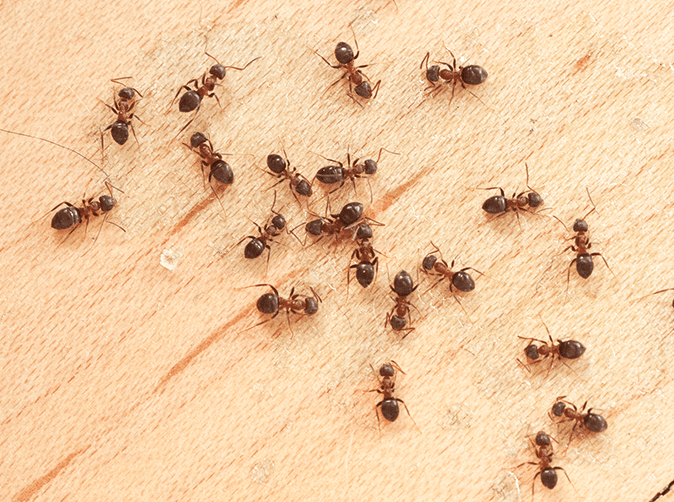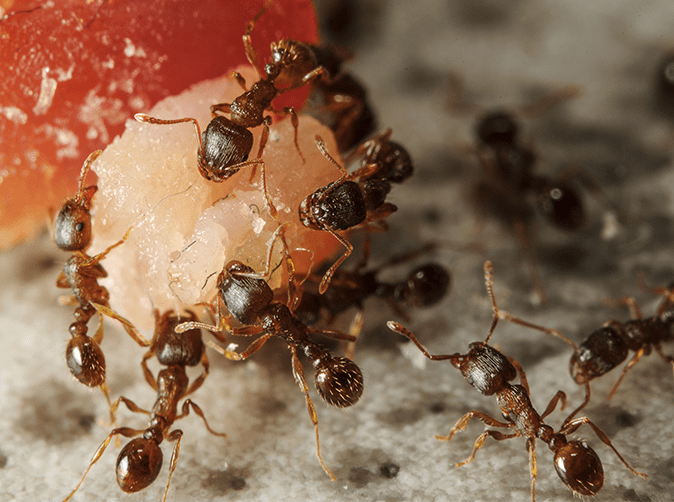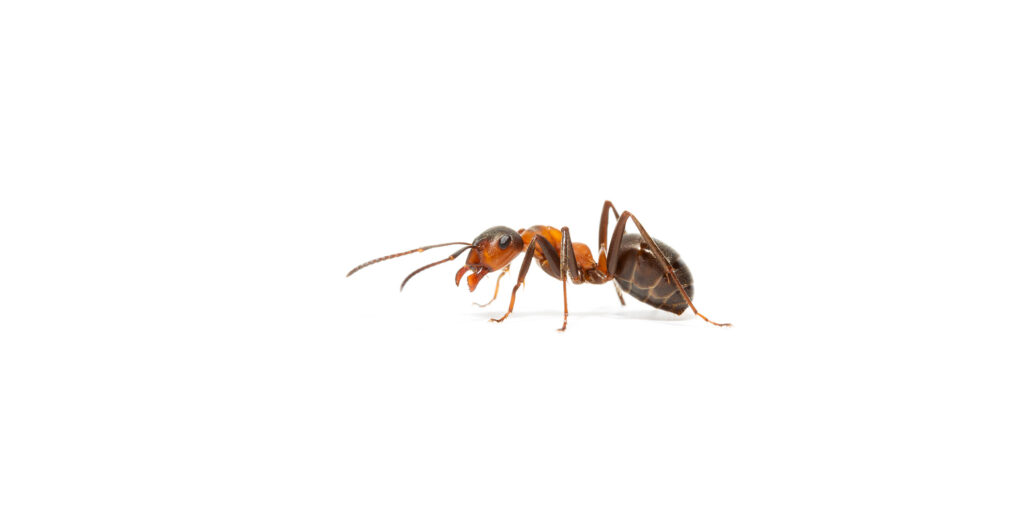What Is An Ant?
Ants are social insects belonging to the order of insects known as “Hymenoptera”. This is the same order containing bees and wasps. Ant problems are difficult for homeowners to deal with because they live in large communities.
These ants in the house depend upon each other for the survival of the entire colony. Ant colonies tend to form underground nests comprised of chambers and interconnecting tunnels.
This is where ants store food, lay eggs and maintain nurseries. There can be tens of thousands of ants in a single colony. There can also be several colonies inhabiting the soil or landscape surrounding a property. For that reason, ants can be a particularly difficult pest to eradicate.
Why Do I Have Them?
All ants share one primary task: to protect and care for the colony. This means they need food, moisture and shelter. A colony of ants may range from a few dozen to tens of thousands.
Outside ant nests are under wood piles, flagstone or brick patios and under rocks and garden stones. Ants in the house may nest in wall voids, behind insulation, or in or around wood already damaged by moisture.
You are most likely to find ants in the kitchen or invading your property elsewhere when they are foraging for food. Foraging ants account for only a small percentage (typically 10% or less) of the colony’s size.
It is important to understand that ants will travel extremely long distances in search of food or harborage. Once these foragers locate and establish a source of food, ants will produce a scent trail (by way of pheromones). The pheromone trail leads to and from the nest and provides direction for the ants to follow between the nest and food source. This is why you will often see ants like the odorous house ant, marching back and forth along one line with little or no deviation.
Request Your Pest Control Estimate
Are they dangerous?
In the Washington, MD and NOVA, most of the ant species dealt with fall into either one or two categories: nuisance pests or wood destroying insects (such as carpenter ants). Fire ants pose a series health threat in southern states as close as North Carolina and parts of Virginia.


Frequently Asked Questions
Integrated Pest Management (IPM) combines years of pest control experience to recognize when which pests are most active and prevent them from entering the home before they become a problem. This practice is more effective, environmentally friendly, and safer for families and pets than previous popular pest control methods. The is one of the safer approaches to pest control while keeping pest populations at an economically manageable level.
Ants can be a particularly difficult pest to eradicate. That’s due to the nature of their foraging habits and colony development. Because only a small percentage of ants within a colony are actively foraging for food, it is vitally important to inspect and locate where the ants are coming from. It is possible for ants to be foraging long distances and the nest may not be located within property boundaries. That is why it is important to call in the American Pest professionals for a thorough inspection. For optimal results, American Pest recommends our Preferred Care residential pest control services. This plan gets rid of ants and other common household invaders with regular treatment visits. It is a bi-monthly pest control service that is effective in preventing ant infestations. It is also backed by our Pest Free Pledge. If pests return between scheduled visits, American Pest returns for free! Contact us today to learn more.
Do-it-yourself methods of ant control often fall short of success. Over-the-counter pesticide products for consumer purchase are not an adequate means to control ant colonies. They are not customized or suited to treat the particular species of ant you are having a problem with. Our trained pest control professionals seek out foraging ant trails around your property. This allows them to locate and eradicate the entire colony. Oftentimes, this may eliminate the need to use pesticides on the interior of the home.
Ants have to work together to build and support their colony. When an ant locates a source of food or water, they give off pheromones as a signal to their colony members. Fellow ants that pick up on the scent know to follow it and give off their own pheromones, strengthening the original signal on the trail so that more ants can find it. Once the source of food or water has been diminished, the ants move on to find new resources and the pheromones from the trail gradually dissipate.
We put your health and safety first: Every product used by American Pest has been EPA registered for pest control use. We then follow a strict set of guidelines in every application of product to ensure that no harm will come to your family or pets. Furthermore, our state-accredited training and continuing education programs set us above the rest. All our pest control professionals are registered and licensed by the state or local jurisdictions where we provide service. Many have achieved Applicator Certification under the category of Industrial, Institutional, Structural and Heath Related pest management.
Flying ants are the only ants that are able to reproduce and the swarms you see every year are the only chances ants have to mate before pairing off to form colonies with the inevitable offspring. If the swarms are too close for comfort, you can vacuum up the insects and dispose of the vacuum bag promptly. (Keep in mind that flying ants are a sign of a colony nesting nearby!)
It is not uncommon when utilizing non-repellant baits for ants to see a sudden, sometimes seemingly drastic increase in the volume of ants within days of the initial treatment. Non-repellant bait materials are targeted towards interior ant infestations and are especially effective in getting rid of ant colonies. When non-repellant baits are used, the worker ants transport the active ingredient back to the colony where it is fed to other members, including juvenile ants. It is important during the initial treatment phase to allow these ants to feed on the bait material in every effort to control colony development.
Preventing ants from invading your property can be difficult. Especially if you are dealing with structural infesting species such as the odorous house ant or the carpenter ant. Reduce the number of instances by cutting back foliage. This applies to shrubs, ornamental grasses and ivy that come in contact with exterior walls or foundation. These natural “bridges” create easy access for ants to enter homes or buildings. American Pest professionals will consult with you to provide a customized solution to your ant problem using our S.T.A.R. system of integrated pest management.
Trusted by 30,000+ Homes & Businesses
“American Pest service technicians are always willing to take their time and listen to concerns, answer questions and crawl around checking out areas that may show signs of intruding insects or rodents.”
“I wanted to write to say how impressed I am with your entire crew and the general way you operate. Everyone who entered my home was sympathetic, sensitive, competent, and respectful. I think what stands out was the way your company understood, and expressed in its own way, the psychological damage that bed bugs inflict.”
“Everyone at this company is wonderful to work with – whether it’s customer service, billing, technicians and even the web team! I love this company!”
“I called American Pest because of an ant problem but they wound up treating so much more. Great conversation with the main office and the tech who came to the house was incredibly punctual, courteous, extremely knowledgeable/excited about his work. Happy to say I no longer share the house with ants or any other insects!”
“Excellent service!! Our rep was great, answered all our questions, and explained things well. Had a lot of spiders and other crawlers; nothing since our service!! Would highly recommend!!”
Contact Us Today!
Do you need an estimate for service or have questions about pests? We’d love to hear from you!
Fill out the form and receive feedback today. For immediate service, please give us a call!

